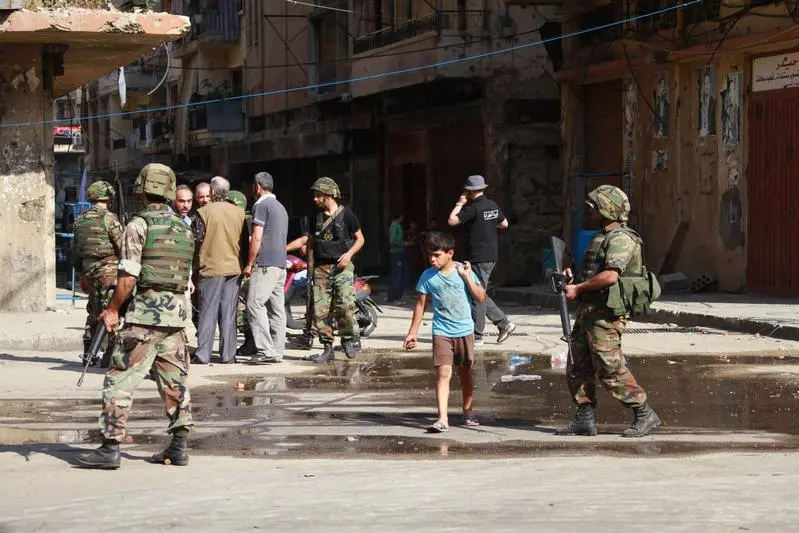PHOTO
BEIRUT, May 24 (Reuters) - The father of a Lebanese soldier kidnapped and killed in Lebanon by al Qaeda's Syrian wing, the Nusra Front, said on television on Tuesday that he had killed the nephew of a man involved in the murder and had dumped the body near his son's grave.
The Lebanese army regularly stages operations against Islamic State and Nusra Front militants when fighting spills over from Syria, incursions that have exacerbated tensions between Sunni and Shi'te Muslims in that part of Lebanon.
Muhammad Maarouf Hamiyeh was among a group of Lebanese soldiers captured during an attack on the Lebanese border town of Arsal in August 2014 and killed four months later by Nusra Front. Others in the group were also killed, some were released and nine are still being held by Islamic State.
His father, Maarouf Hamiyeh, called into Lebanese television station al-Jadid and said he had kidnapped and murdered the nephew of a Lebanese man, Mostafa al-Hujairi, who Hamiyeh has accused of having helped deliver his son to the militants.
Lebanon's National News Agency said the army was now searching for Maarouf Hamiyeh in his village near the town of Arsal, near the mountainous northern border with Syria, where conflict has been raging for more than five years.
Hamiyeh told al-Jadid he would not rest until others from the same family, that he says were involved in his son's murder, were also killed. He also said that he took revenge because the state was not doing enough to punish the perpetrators.
"We carried out the killing of the Hujairi son to avenge our martyred son. We carried the body and put it on the grave," Hamiyeh said. "This is a direct confession, my son's blood was not shed in vain."
"If the Hujairi family retaliates, we will open fire upon the whole family," he said.
None of the Hujairi family have commented publicly on Hamiyeh's accusations.
Al-Jadid broadcast photographs which it said showed the body of Hussein Hujairi. They showed a man in stained jeans and a black sports jacket lying on his back with a number of bullet holes visible.
(Reporting by Laila Bassam and Lisa Barrington; Editing by Louise Ireland) ((lisa.barrington@thomsonreuters.com; +96101954456;))
The Lebanese army regularly stages operations against Islamic State and Nusra Front militants when fighting spills over from Syria, incursions that have exacerbated tensions between Sunni and Shi'te Muslims in that part of Lebanon.
Muhammad Maarouf Hamiyeh was among a group of Lebanese soldiers captured during an attack on the Lebanese border town of Arsal in August 2014 and killed four months later by Nusra Front. Others in the group were also killed, some were released and nine are still being held by Islamic State.
His father, Maarouf Hamiyeh, called into Lebanese television station al-Jadid and said he had kidnapped and murdered the nephew of a Lebanese man, Mostafa al-Hujairi, who Hamiyeh has accused of having helped deliver his son to the militants.
Lebanon's National News Agency said the army was now searching for Maarouf Hamiyeh in his village near the town of Arsal, near the mountainous northern border with Syria, where conflict has been raging for more than five years.
Hamiyeh told al-Jadid he would not rest until others from the same family, that he says were involved in his son's murder, were also killed. He also said that he took revenge because the state was not doing enough to punish the perpetrators.
"We carried out the killing of the Hujairi son to avenge our martyred son. We carried the body and put it on the grave," Hamiyeh said. "This is a direct confession, my son's blood was not shed in vain."
"If the Hujairi family retaliates, we will open fire upon the whole family," he said.
None of the Hujairi family have commented publicly on Hamiyeh's accusations.
Al-Jadid broadcast photographs which it said showed the body of Hussein Hujairi. They showed a man in stained jeans and a black sports jacket lying on his back with a number of bullet holes visible.
(Reporting by Laila Bassam and Lisa Barrington; Editing by Louise Ireland) ((lisa.barrington@thomsonreuters.com; +96101954456;))





















